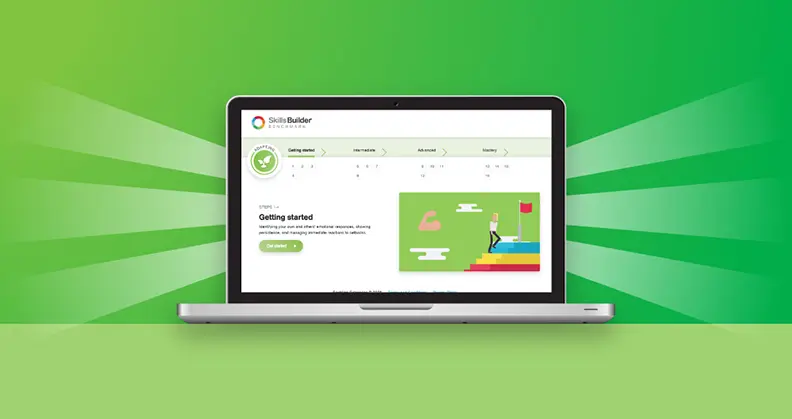The Skills Builder Partnership brings together educators, employers and impact organisations around a collective mission: ensuring that one day, everyone builds the essential skills to succeed.
That Partnership is now more than 700 organisations strong, with huge diversity across us: from primary schools to colleges, from small start-ups to international corporates, and from local youth groups to national programmes like National Citizens Service or the Careers & Enterprise Company.
What joins us all together is a shared language and common outcomes for essential skills, provided by the Skills Builder Universal Framework. This Framework defines essential skills as ‘those skills that almost everyone needs to do almost any job” and breaks them down into eight skills:

It then goes further, by breaking each skill down into 16 smaller skill steps – providing a clear pathway from being an absolute beginner through to mastery.
What partners are doing
The Partnership works because every partner brings a different expertise – whether it’s The Economist Foundation focusing on critical thinking skills of creativity and problem solving, or ELBA building the essential skills of jobseekers. At the same time the alignment behind the Framework means that for any individual they have the chance to hone their essential skills through the combined efforts of any number of partners.
That alignment and resulting collaboration and sharing of best practice means that the expertise and impact of the partners are multiplied.
How to measure the collective impact
The challenge we have been grappling with over the last two years as the Partnership has grown is how best to capture that growing collective impact.
We know from our latest series of research that building essential skills has an impact:
- This literature review showed that building essential skills boosts academic outcomes, employability outcomes, and well-being.
- Our analysis of the British Cohort Study showed that essential skills were linked to improved literacy and numeracy at age 10, and careers aspirations and academic achievement at 16.
- Our latest research showed that there is a wage premium to building essential skills for young people, as well as positive effects around self-efficacy and perseverance.
Capturing the broader impact of the Partnership is no easy task though: partners have traditionally had different approaches to measuring impact and these measures cannot be easily aggregated. Partners’ programmes also vary considerably by their scale and intensity, meaning that it is not just a case of counting them.
So, we’ve tried a new approach to think about the impact of our collective. We have been refining a model of thinking about different Impact Levels – to recognise the varying intensity of programmes, whilst recognising that programmes of all Impact Levels have a role to play.
The Impact Levels
The Skills Builder Impact Levels can be achieved at four levels:

Impact Level 1: Raising awareness of essential skills
Programmes that are successful at this level make individuals more aware of the eight essential skills and their importance for success.

Impact Level 2: Reflecting on essential skills
Programmes that are successful at this level give individuals the opportunity to become more self-aware of their skill levels and next steps by reflecting on their essential skills.

Impact Level 3: Practising essential skills
Programmes that are successful at this level give individual the opportunity to apply and practise their essential skills and the steps.

Impact Level 4: Progressing in essential skills
Programmes that are successful here combine the chance for individuals to reflect on their essential skills before and after applying them, with content specifically targeted on steps of progress.
Bringing this together
From April 2021, we will be launching the Impact Directory. This will be a comprehensive database of all programmes from our partners which meet the Impact Levels. This will enable schools, colleges, individuals, employers and commissioners to identify those programmes which make a demonstrable impact on individuals’ awareness, reflection, practice or progress in essential skills.
Behind the scenes, we will also be able to start aggregating the opportunities being created, and the number of individuals whose essential skills develop through those different routes. As we start gathering more data on individuals’ progression in essential skills, we will also be able to start sharing lessons across the Partnership on what works.
We have an incredible opportunity to solve the seemingly intractable problem of how to set everyone up with the essential skills – but only by working together. These Impact Levels and Directory will be the critical next steps to do so.
You can read more about the Impact Levels in this Guide. Impact Organisations who are interested in being involved should contact us here, and we’ll get in touch.






